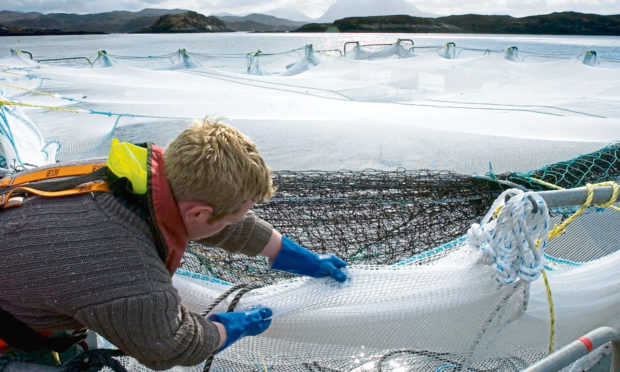Two of Scotland’s largest salmon farming companies are swapping sites in the Outer Hebrides in a move they say will help them tackle fish health problems such as sea lice and create operational efficiencies.
Norwegian aquaculture giant Mowi and the Scottish Salmon Company (SSC) said the exchange of operations in Harris would support “continuous improvement” and management of stocks.
The agreement will result in ownership of SSC’s Trilleachan Mor site on Loch Seaforth on the east of the islands and its Scaladale shore base pass to Mowi.
In return, SSC will assume control of Mowi’s Scotasay and Raineach sites, further south on Harris, and the shore base at East Loch Tarbert.
The firms said all staff would be redeployed and the swap, due to be completed by the end of this month, will be carried out in accordance with all regulatory requirements, including the transfer of relevant licences.
The move has been welcomed as a “positive development” by industry body the Scottish Salmon Producers Organisation (SSPO) and described as a “step in the right direction” in reducing health risks by the Outer Hebrides Fisheries Trust (OHFT).
Mowi and SSC, which is headquartered in Edinburgh, said the exchange would allow them to consolidate management of the Harris sites, rather than continuing to operate across geographically disparate locations.
The “largest gain” would be in sea lice control, with “faster and better co-ordination” of resources, they added.
SCC chief executive Odd Eliasen said: “The nature of salmon farming means we operate sites in remote and often disparate locations.
“Working in partnership with Mowi, we both appreciate the opportunity to restructure the ownership of our sites around Harris that would not only create operational efficiencies but would be key for both companies to continue to improve health management of stock.”
Ben Hadfield, Mowi’s chief operating officer for farming in Scotland, Ireland and the Faroes, said: “This site exchange is a prime example of how positive collaboration between companies can lead to a win-win situation both from a fish health perspective and environmentally.
“It is encouraging to see agreements like this materialise and it certainly opens a door for future collaborations that contribute to the sustainable development of our sector.”
SSPO head of technical Iain Berrill said the agreement had positive implications for the salmon farming sector as a whole in Scotland and was in keeping with its recently-launched sustainability charter.
Richard Davies, of the OHFT, added: “Whilst we would prefer biological separation of farmed fish from the wild to eliminate risk of lice or disease transmission, consolidating sites like this should be a step in the right direction in reducing risks where they currently exist.
“It will make our role of monitoring impact on wild fish and communication easier and, in theory, it will make co-ordinated treatment easier for the operators.
“Salmon farms have a duty not to jeopardise wild fish populations and OHFT look forward to seeing the operators involved in the site exchange initiative demonstrating the positive environmental outcomes.”
